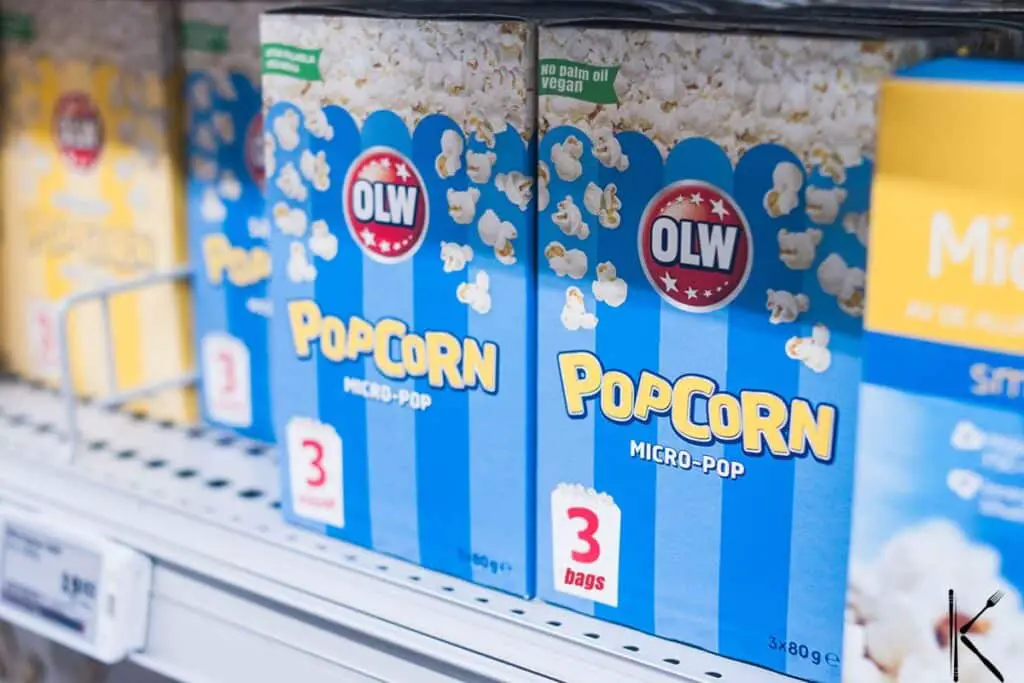Quick summary: Yes, popcorn can go bad in taste and texture, but it’s unlikely to become unsafe to eat. Signs that popcorn has gone bad include a stale smell, discoloration of kernels, and a decrease in popping quality. To extend the shelf life, store popcorn in a cool, dark place, seal it well after opening, and protect it from moisture.
Popcorn is probably a favorite snack for movie night, game-watching, or hanging out with friends, and they are loved even by those who watch their weight. Popcorn is a low-calorie diet snack if you don’t add too much dressing. So the only question left is, can they go bad?
For starters, you probably know that there are different versions of popcorn. We have those already popped ready to eat. They are mostly in a bag, and you have no trouble preparing. Then the popcorn kernels intended for the microwave. And classic popcorn kernels that you prepare on the stove. The duration and spoilage are different for each, so let’s unroll the details.
How Long Does Popcorn Last?
As we have hinted, they have different durabilities depending on your popcorn type.
So does popcorn expire? Here’s what you can expect.
Ready to eat popped popcorn
Popped popcorn that is ready for consumption directly from the store is the fastest and proven to be good.
These commercially popped popcorn are unlikely to be unsafe to eat, especially if unopened. However, you should follow the instructions on durability on the packaging because you will get soggy and tasteless popcorn after the expiration date. You can probably count on two to three weeks after the expiration date, but that’s more or less it.
Microwave popcorn
Popcorn in an airtight container intended for the microwave already has all the necessary ingredients, salt, oil, butter, and other dressing. That’s why they can’t last as long as regular kernels. You can still count on the packaging to be entirely in order approximately two to three months after the expiration date. But expired microwave popcorn surely won’t be able to stand in your kitchen cupboard for months after that.
Plain kernels
These are the most endurable popcorn. However, please don’t count on unpopped popcorn kernels being good forever. They will certainly be safe to eat, but the potency of popping will weaken, so you won’t get fine and delicious popcorn. With good storage, unpopped kernels will be perfectly okay for up to half a year after expiration and possibly even longer.
Can Popcorn Go Bad?
Yes and no. There is little chance that popcorn will become inedible in the sense that it will cause you some indigestion. However, the enjoyment of food can be significantly reduced due to the age of the popcorn. It will harden over time, will not pop nicely, and will not be as tasty. Here’s how you may notice they’re ready for the trash.
Sign 1: Too much time has passed
Regardless of the symptoms, if you have popcorn that has passed the time instructions we described earlier, throw it away, especially when it comes to microwave popcorn. Since they have much more ingredients mixed in a bag, you should not eat expired microwave popcorn if too much time has passed.
Sign 2: They smell stale
If you have stale popcorn that smells unpleasantly like staleness, it’s very likely they’ve expired. The taste won’t be good, so you don’t even have to try serving them.
Sign 3: Kernels are discolored
In the case of kernels, they may get some freckles of a different color, or their bottom will be black. This means that their shelf life has already passed, and you will hardly get large puffy popcorn from such corn kernels.
What Is The Best Way To Store Popcorn?
Storing popcorn is probably the simplest possible instruction you will receive. There are just a few basic rules, and shelf life of popcorn should be long. As for freshly popped popcorn, you should store them in the belly as soon as possible to get the best flavor.
Tip 1: Keep in a cool and dark place
Without a lot of philosophizing, the pantry will be the perfect choice for popcorn. The second best place is in the kitchen cabinet, away from heat sources. Make no mistake and keep unpopped popcorn or dry kernels in a cupboard above the stove, as cooking steam could ruin their durability.
Tip 2: Seal well
Once you open the popcorn package, it is very important to close it well. In theory, ready-to-eat ones can last up to a week or two after opening. However, practice shows that they will hardly be delicious for such a long time, so it is better to eat popcorn kernels fresh.
Tip 3: Avoid moisture
You want to keep popcorn away from moisture no matter what type of popcorn you have. This will make them soggy and definitely ruin any pleasure of eating. Avoid all dump places to keep your popcorn stored properly.
FAQs
Is it bad to eat expired popcorn?
No, it’s generally not bad to eat expired popcorn as long as there are no signs of spoilage such as mold or unusual odors.
How do you know if popcorn goes bad?
You can tell if popcorn has gone bad by looking for signs of mold, unusual odors, or a rancid taste. If the kernels or popped popcorn show any of these indicators, it’s best not to consume them.
Does popcorn go bad unpopped?
No, unpopped popcorn kernels do not go bad. Unpopped popcorn kernels can last indefinitely when stored in a cool, dry place, making them unlikely to go bad.
Conclusion
Popcorn is without a doubt one of the best additions to a movie night, whether you are at home or at the cinema. Also, they are a very healthy choice for a snack because, in competition with other snacks, such as chips or nachos, they have by far the fewest calories.
It’s great that they are actually very durable, so not much should be disturbed in their taste and texture, especially as long as the shelf date is valid on the packaging.
If you notice that the popcorn has become gummy and stale, unfortunately, it’s time to discard them and buy new stock. Be sure to check this out before the family movie night starts, so there aren’t a lot of disappointed movie buffs.
See more:









